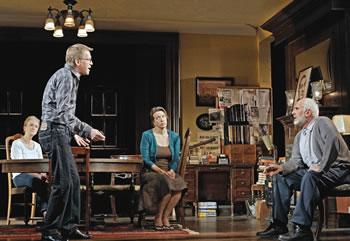
Absolute Ambivalence, or
The Magpie's Revenge
By Jonathan Kalb
The Intelligent Homosexual's
Guide to Capitalism and Socialism with a Key to the Scriptures
By Tony Kushner
The Public Theater
425 Lafayette St.
Box office: 212-967-7555
Tony Kushner has described himself as an
inveterate magpie, a tireless accumulator and amalgamator of diverse
influences. His earliest works were sincere attempts to channel
Brecht and Caryl Churchill, but he also watched a lot of crap
TV and Hollywood trash as a youngster, read comics, the Bible,
histories of religion and all the canonical American family dramas,
and formed a deep attachment to Ludlam's Ridiculous aesthetic.
Famously, he went on to weave those unlikely threads together
into the fabulous epic cloth called Angels in America.
Theatrically speaking, his new play is
shockingly straightforward by comparison, despite its playfully
sesquipedalian title--The Intelligent Homosexual's Guide to
Capitalism and Socialism with a Key to the Scriptures. This
work isn't really "epic" or "fabulous" in any established sense.
It's basically a realistic family drama in the time-tried mold
of O'Neill and Miller, about a retired longshoreman and lifelong
communist forced to explain to his loving but self-involved and
otherwise screwed-up children why he wants to kill himself.
Many of its themes and topics echo those
in Angels: betrayal and abandonment within gay marriage,
scriptural guidance sought for decidedly modern and material problems,
gay camp used as a general social lubricant, classical quotation
used as a means of jump-cutting from the specific to the general.
The difference is that The Intelligent Homosexual juggles
all of this with far less theatrical variety and inventiveness.
Nearly four hours long, it is often shaggy and rhetorical, woolly
and diffuse, and now and then it strains to compensate (or apologize)
for its formal conventionality--several extended and tedious sequences
when the actors all speak at once, for instance. Despite this,
the play is also incisive, passionate, courageous, absorbing,
and uniquely ambitious--exactly the sort of smart, messily risky,
broadly inquisitive project that our theater needs to see far
more often if it's ever to snap out of its current doldrums.
The Intelligent Homosexual has
the feel of a political sequel to Angels in America,
because its underlying subject is the debilitating disappearance
of utopian ideals in the Western world. Angels ended
(in a scene set in 1990) on a vaguely hopeful note, looking toward
a future of collapsed "beautiful systems" and "old fixed orders"
heralded by the end of the Soviet Union. The Intelligent Homosexual
picks up in 2007 amid the stalemate that emerged from that
upheaval, when consumerism is triumphant, the political left has
been backed into the defensive, ameliorative posture we know all
too well, and intelligent people no longer ponder systematic alternatives
to gloves-off capitalism. Gus, the aging communist--played with
searing precision and palpable rage by Michael Cristofer--shocks
no one in announcing that he would rather not live in such a world.
This man spouts Marxist theory and union
slogans on the slightest provocation, but he is also haunted by
his betrayal of his principles years ago. What's more, his activist,
working-class forefathers also betrayed those principles under
pressure, in troubling ways that materially benefited Gus, so
he is aware that his bravura pose of moral superiority is manifesto-thin.
That knowledge increases his self-loathing. Kushner has been extremely
clever in aligning the details of his complicated family drama
with this overarching political conundrum. Each of Gus's three
children is caught up in a different personal crisis that sheds
fresh light on some facet of the larger debate about communal
identity and responsibility.
Yet what makes the play truly compelling
and heartbreaking is the way it probes the characters' psychological
crises. None is all that remarkable in itself--one son spends
$30,000 of his sister's money on a hustler, for instance, another
secretly impregnates that sister's lesbian lover--but Kushner
ruthlessly squeezes the roots of these stories as no other living
playwright would, pressing each to such a pitch of emotional revelation
(with much help from his splendid 11-member cast, directed
by Michael Greif) that the result is vivid theatricality drawn
improbably from moral imaginativeness.
There are times, it must be said, when
The Intelligent Homosexual feels more like a dramatized
essay than a play. I suspect that is because Kushner used it in
part to respond to some of his critics. I have no hard evidence
for this but the soft evidence in the text is pretty convincing.
Over the years, its rave reviews and canonical stature notwithstanding,
Angels in America has been attacked rather severely by
leftist scholars who object to its political ambivalence. They
have damned it for proposing no explicit alternative political
system, for subordinating its "epic" action to personal stories,
and for using revolution as a mere figure of speech. In focusing
this new, lengthy work on the thoughts of a character driven to
despair by precisely the ambivalence of which he was accused,
Kushner essentially batted the ball back into the court of those
tenured radicals. And his stroke was clean, firm and powerful,
since Gus, just the sort of absolutist who would denounce Kushner
as a weak-kneed gradualist, cannot survive in the real world.
---------------------------
To read this article in Finnish translation,
click HERE.
